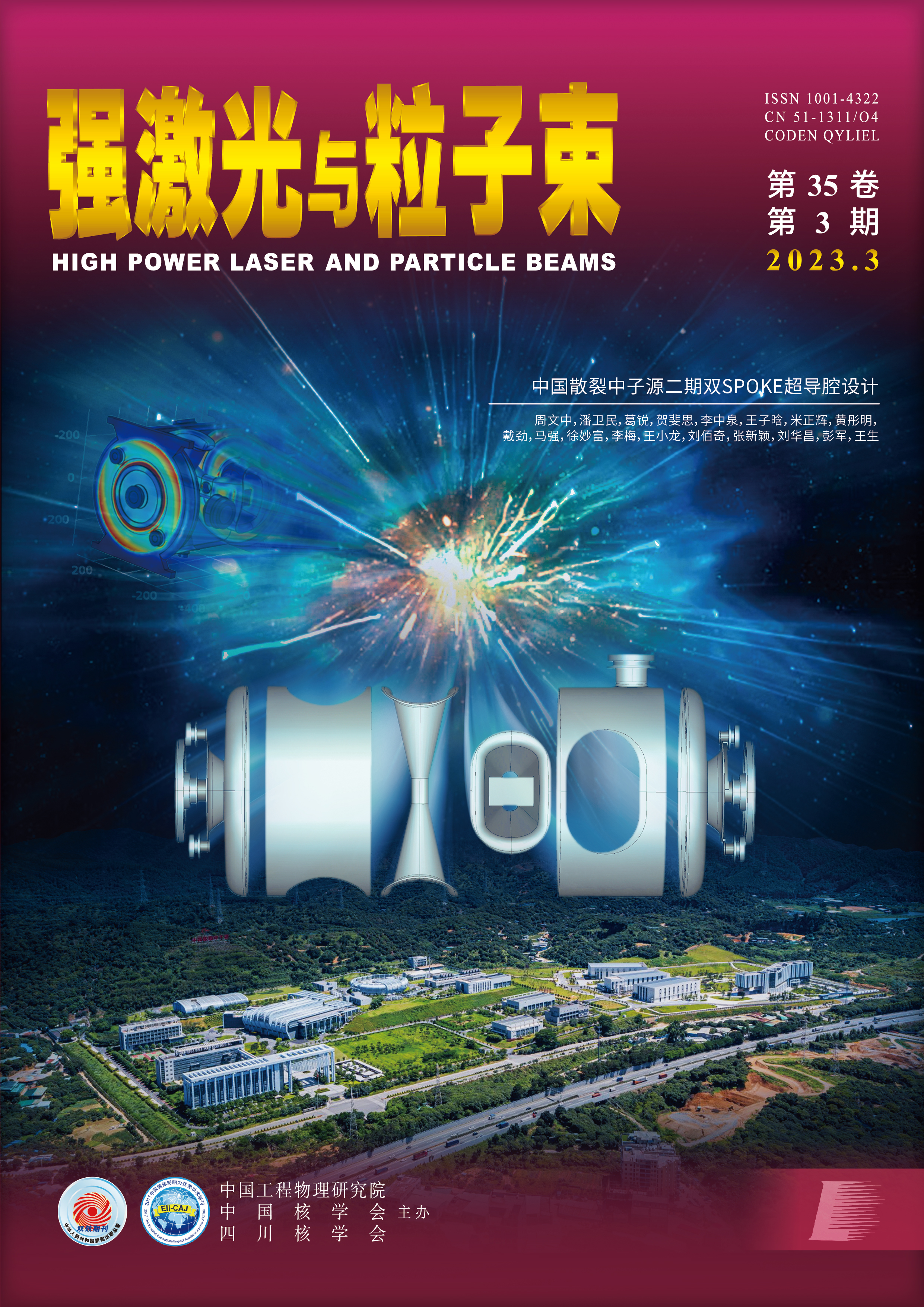
Since dynamic X-ray fluorescence imaging technology requires diagnostic equipment which has high throughput and narrow spectral width, we present the design of four-channel spherically bent crystal imaging system. The system adopts a cone spatial configuration to solve the problem of multiple channel coupling. With the size limit of framing camera taken into account, the images are reasonably planned by adjusting the position of bent crystal. We utilize Ge 400 crystal as the imaging component at 4.51 keV and then propose optical initial structural parameters of system. Grid backlit images of single channel are obtained by using X-ray tube in the laboratory. The magnification is 7.8, and the spatial resolution is 15 μm. The results preliminarily verify the performance of system. The four-channel system combined with the framing camera can effectively solve the technical difficulties such as weak signal and low signal to noise ratio in dynamic fluorescence imaging.
The efficiency of power synthesis will be reduced due to the difference of gain and phase consistency between solid-state power source modules. In this paper, a model of the impact of gain and phase consistency on the efficiency of power synthesis is established. Base on this model, the synthesis efficiency distribution under different gain and phase distributions is calculated with the MATLAB software. The simulation results provide the specific phase and gain index for the transmitter design and a strong theoretical basis for the evaluation and acceptance of the transmitter.
Microwave discharge is a kind of non-polar mode, which may form plasma that has the characteristics of transient, low temperature, non-equilibrium and so on at atmospheric pressure. A microwave plasma experimental facility with quasi optical focusing reflector is introduced, including the atmospheric environment simulation chamber and microwave transmission focusing system. A non-uniform strong electric field of kV/cm magnitude formed by focusing microwave power in the chamber, with plasma motivated in the central region. The distribution of the electric field in the chamber is calculated and measured. The results are in good agreement. And the shape of the plasma is also consistent with the intensity of the electric field. The plasma images under different parameters were observed by the camera through the device. The capability of the device was verified, which laid a foundation for further study of microwave atmospheric breakdown.
This paper aims to design a new 650MHz variable fundamental power coupler. The external quality factor Qe ranges from 1.5×105 to 2×106 to meet the requirements of different current modes of the Beam Test Facility of PAPS (Platform of Advanced Photon Source Technology R&D). This is the first time to develop a variable continuous wave type power coupler in China. In this paper, the RF transmission and field distribution of the coupler are calculated by HFSS three-dimensional electromagnetic software. The external quality factor at different antenna penetration depth is simulated by CST microwave studio. The penetration depth adjusting experiment is carried out by integrating with a 650 MHz 2-cell superconducting cavity. The simulated and measured results of Qe agree well with each other.
This article introduces a low-cost and high-efficiency W-band 4×4 substrate integrated waveguide(SIW) slot array antenna. The antenna consists a two-layer structure: the top radiation layer uses wide edge longitudinal offset slots standing wave array, which could realize high radiation efficiency; the bottom feeder layer adopts substrate integrated waveguide central rotate slots for feeding, which could decrease the transmission loss and realize difficulty of traditional power divider networks. Simulation software Ansys Electronic is used for optimizing the antenna array. The antenna sample is fabricated using the standard printed circuit board process. The test results are in good agreement with the simulation results. The maximum gain of the antenna array at 94 GHz is 16.8 dB, reflection coefficient is -30.1 dB, -10 dB bandwidth is 92.6-96 GHz, sidelobe level is 19.5 dB,the aperture efficiency of antenna array is 83%.
In this paper, a novel dual-mode dual-band bandpass filter using a quad-mode dual-stub loaded T-type resonator is proposed. The quad-mode resonator is analyzed using odd-/even-mode method. Field distribution of each mode is illustrated, and each mode can be independently controlled. The required extra quality factor (Qe) can be realized by determining the proper feed-lines parameters, and detail analysis is provided to adjust bandwidth of filter passbands. Then the cause of the zero point of the filter transmission is analyzed get the rule of the zero point change is got for adjusting the zero position and improving the selectivity of the filter. defected ground structure (DGS), etched on the bottom metal surface of the filter, working as a non-resonant node (NRN) and proving source-to-load coupling, are utilized to introduce extra transmission zero to improve the passband selectivity without increasing filter volume. The filter was designed and fabricated, and the simulated results are in accordance with the measured results.
The carbon fiber reinforced composite (CFRC) plate was represented by a single-layer homogenous anisotropic model, and then a full wave analysis based software was employed to simulate the induced current on termination loads of the transmission line composed of a conducting wire and the composite plate. Results show that variation of the induced current is similar to that of the conducting wire above the lossy homogenous conducting plate with same conductivity when the wire is parallel to the carbon fibers, and the induced current magnitude is higher than that of the wire orthogonal to the carbon fibers. Moreover, the induced current for the normal incidence of electromagnetic wave to the composite plate is greater than the current for the wave propagates along the plate, with the electric field parallel to the wire in both cases.
The contour path (CP) based modeling of thin slots in finite-difference time-domain (FDTD) simulation of complex structures breaks the constraint that the mesh size should be less than the smallest dimension of thin slots to get more accurate results, and therefore greatly reduce the consumption of computing resources. A large-scale parallelization platform JASMIN based modeling method of CP-FDTD is proposed in this paper. The thin slots can be automatically modeled and adaptively allocated in the proposed parallelized CP-FDTD algorithm. The electromagnetic shielding effectiveness (SE) of the metal cavity with different thin slots commonly used in industry is analyzed at the frequency range of 0.05 GHz to 3.00 GHz using the proposed parallel CP-FDTD algorithm. Results show that the SEs predicted using the developed parallel CP-FDTD are in good agreement with those obtained using finely meshed FDTD (fine-FDTD). Moreover, the computational efficiency is significantly improved.
Series type energy recovery circuit guarantees the safety of charging power supply in pulse power system under abnormal conditions relying on circuit structure, but oscillation of recovery circuit will occur when the load capacitor is charged via recovery inductor by constant current charging power supply, which will not only cause the overvoltage of charging power supply and increase the loss of recovery inductance, but also lead to obvious deterioration of voltage consistency. Based on the analysis of the oscillation characteristics of the recovery circuit, the structure of the bypass switch connected with the recovery inductor and the double input for recovery circuit and the corresponding charging control method are proposed. It can not only suppress the oscillation of the circuit to improve the charging voltage consistency, but also significantly reduce the unnecessary loss of the recovery inductor and the bypass switch, besides, the control method is simple and universal. The circuit simulation and the experiment were carried out on a 600 V/400 A charging system with a series type recovery circuit, and the experimental results show that with the improved recovery circuit, the consistency deviation of the load capacitor voltage is reduced to 2.6 V from 10 V, and the relative deviation is reduced to 0.5% from 1.7% under the condition of 600 V pulse repetition.
A compact series resonant high voltage capacitor charging power supply with an average charging power of 12 kW is developed based on full bridge series resonant constant current charging technology to meet the repetitive charging requirement of a high power pulsed generator. The power supply uses supercapacitor pre-storage and full-bridge series resonant circuit, which greatly reduces the demand for environmental power supply. Combining with modular integrated design, the integrated and portable design is realized. According to the working requirement of the pulsed power generator, this paper analyses the basic principle and working process of the full bridge series resonant circuit, presents the design method of circuit parameters and the circuit simulation results. The power supply developed was used to charge a PFL-Marx pulsed power generator with the equivalent capacitance of 0.3 μF, the charging voltage was more than 60 kV in 45 ms. The experimental results show that its output capacity meets 20 Hz repetitive charging requirement of the PFL-Marx pulsed power generator.
One Marx generator for triggering switch of pulse power system is developed. The basic principle and main parameters are specified. The coaxial structure and resistor type design are adopted. The output parameters of generator on matched load, 75 Ω, are higher than 200 kV voltage amplitude, more than 90ns pulse width, single to 10 Hz repetition operation, less than 10 ns rising time, less than 20.1 ns time jitter.
As the core equipment of the neutral beam injection heating system, the performance of arc power supply is very important. With the development and popularization of super capacitor technology, arc current power supply based on super capacitor has been widely used in many large-scale scientific devices. Pit circuit is an important component of arc current power supply. Its dynamic response characteristics and stability determine the performance of arc current power supply. A new current transfer circuit for arc current power supply is proposed in this paper, which can quickly fall and recover large current in 100 μs, and there is no overshoot in the fall and recovery process. The electronic switch for transfer (such as IGBT) has small overvoltage, high reliability and easy absorption circuit in the process of switching. The scheme is a good alternative to the traditional current pit circuit.
Dynamic response time is a key index of thyristor controlled reactor(TCR) type static var compensator(SVC) dynamic performance. Aiming to solve traditional detection problems of no unified datum time and overdependence on indirect measurement, assessment method of TCR dynamic response time based on real firing angle detection is proposed. According to a step reference signal trip generated fixed capacitor(FC) zero-crossing trip, datum time is unified. Then the response time is determined by comparing TCR real firing angle with lower limit value. The experimental result shows that this method can be effectively applied to analyse and evaluate dynamic response performance of large capacity TCR type SVC.
The development of high-efficiency green electric furnace smelting technology is an important measure to eliminate backward production capacity and upgrade the steel industry. It is essential to prevent voltage drops caused by reactive power shocks in electric arc furnace operations. At present, the single active or passive compensation method cannot meet the need of both the increasing large capacity load and fast response period of reactive power compensation device. The hybrid compensation method combining static var compensation(SVC) and static var generator(SVG) is studied in this paper. The characteristics of SVC in phase-separated unbalanced large-capacity compensation and SVG in fast response of reactive power are analyzed. The reactive power demand of an electric arc furnace is calculated. A hybrid scheme is designed to offset the residual reactive power gap, and PSCAD/EMTDC is applied for joint application simulation to confirm the theoretical validity.
The plasma discharge duration of EAST (Experimental Advanced Super-conducting Tokamak) is designed to be 1000 s, the time has exceeded 100 s at present. As the core subsystem, poloidal field power supply(PF) has nearly 200 signals to be stored. For every discharge, the amount of data is very large, ordinary database can’t meet the requirement of long pulse data storage. This paper uses HDF5 (Hierarchical Data Format) to store the long pulse data. HDF5 is a file format that can store different types of images and data. Using C interface of HDF5 to design a dataset with compound datatype, to realize real-time writing and reading, the primary discharge time is segmented and the data is written and read as chunks. Visualization tool Hdfview is used to view the dataset, and Qt is used to read HDF5 file and display waveform. It proves the correctness of compound datatype and chunk dataset, and the feasibility of writing and reading as chunks. Simple time test proves that writing and reading as chunks are efficient.
The performance of fast burst reactor (FBR) is mainly restricted by the physical damage caused by the mechanical shock. The smaller burst width and larger fission yield in high-yield FBRs indicate more significant stress variation. To obtain the temporal and spatial distributions of stress/strain of burst in the high-yield FBR and to provide technical support for the design and safety analysis of new-type FBRs, the neutronic calculation based on the point kinetic approximation and Monte Carlo method is first performed to obtain the temporal and spatial distributions of fission power in the cylindrical FBR Godiva IV, the three-dimensional thermoelastic behavior in the burst is then simulated by using the finite element method software ANSYS Mechanical. The dynamic response of stress in material component is obtained and analyzed. The results show that the cylindrical fuel will suffer a stress wave during the burst and the maximum stress occurs in the radial cracking of central fuel rings.
Active power filter (APF) is the key equipment to realize power quality management in power system. Harmonic detection is one of the key technologies of APF. The detection accuracy and response speed directly determine the overall performance of APF. In this paper, the traditional ip-iq harmonic current detection algorithm based on instantaneous reactive power theory is introduced; and the detection accuracy is affected by the phase error of the phase locked loop output and the response speed of the harmonic detection system is limited by the existence of low-pass filter. An improved harmonic detection algorithm is proposed by frequency-locked loop technology. The algorithm can generate unit sine and cosine signals with the same frequency of grid voltage, and moving average filter (MAF) is used instead of low-pass filter to improve its response speed and harmonic detection accuracy. The algorithm is analyzed theoretically and simulated by MATLAB. The theoretical analysis and simulation results prove the effectiveness of this method.
CR39 detector can be used to detect the ions in laser-plasma physics experiments and to obtain information about the number, kind and energy of incident ions. Using phenomenological model, we numerically simulated the formation process of ion track in CR39 using energy loss dynamics equation and particle swarm optimization (PSO) algorithm thus studied the revolution of the ion track in CR39 during the etching process. The corresponding relationship between ion energy and track diameter and depth was obtained. It is found that when the ion range was equal to the etching depth in CR39, the track depth was the largest. The equation of the critical energy with which the track is the deepest and determined by the etching time was given.
Based on the technology maturity, four typical nuclear fuel cycle options, namely, OTC, TTC, FRC and HRC, were selected for analysis. The sustainability of different fuel cycle options was studied using the balanced mass flow model, and the fuel cost and spent fuel disposal cost of different options were evaluated based on levelized cost of electricity calculation method. The results show that closed fuel cycle can greatly reduce the production of nuclear waste. And the FRC option with fuel self-supporting as well as the HRC option can use depleted uranium without consuming natural uranium. Besides, the HRC option is the most economical while the TTC option is the worst, considering only fuel cost and spent fuel disposal cost.
As the most promising commercial lithium-ion battery, the LiNi1-x-yCoxMnyO2 cathode have become the focus of researchers in recent years. However, there are less researches on the synthetic process of this material. This paper discusses various sintering processes of LiNi0.8Co0.15Mn0.05O2, and the characterization and electrochemical performances testing of the prepared cathode materials. The research shows that the material has higher specific capacity (about 200 mA·h·g-1) at 0.1C (C is battery capacity rating value) charging-discharging rate. At 1C and 100 times of charging-discharging, the capacity retention ratios of 480 ℃@3 h + 780 ℃@5 h and 500 ℃@5 h + 780 ℃@10 h sintering processes are 94% and 86%, respectively, which illustrates the synthetical properties of the cathode materials prepared by these two processes are optimal.










